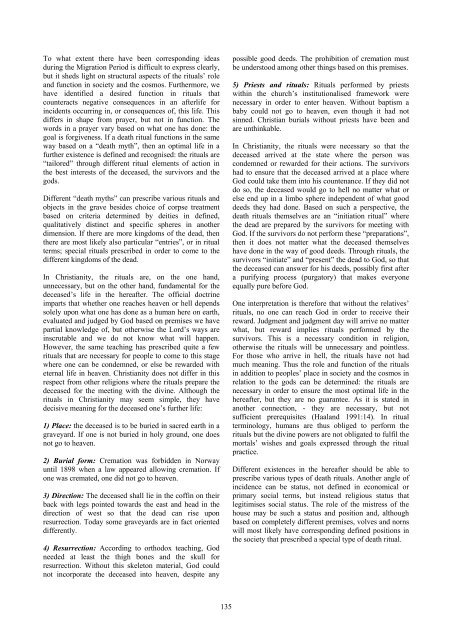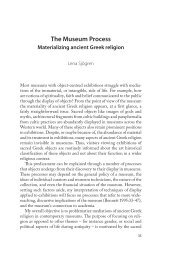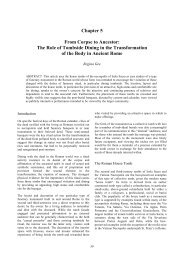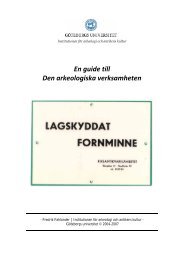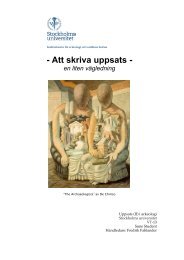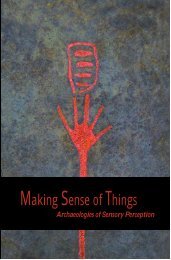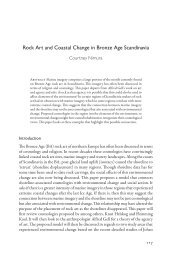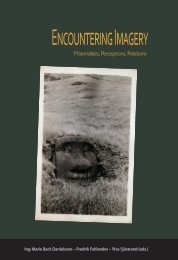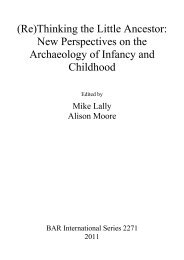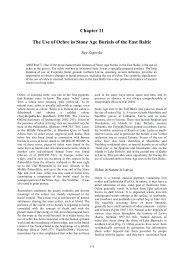The Materiality of Death - mikroarkeologi.se
The Materiality of Death - mikroarkeologi.se
The Materiality of Death - mikroarkeologi.se
You also want an ePaper? Increase the reach of your titles
YUMPU automatically turns print PDFs into web optimized ePapers that Google loves.
To what extent there have been corresponding ideas<br />
during the Migration Period is difficult to express clearly,<br />
but it sheds light on structural aspects <strong>of</strong> the rituals’ role<br />
and function in society and the cosmos. Furthermore, we<br />
have identified a desired function in rituals that<br />
counteracts negative con<strong>se</strong>quences in an afterlife for<br />
incidents occurring in, or con<strong>se</strong>quences <strong>of</strong>, this life. This<br />
differs in shape from prayer, but not in function. <strong>The</strong><br />
words in a prayer vary ba<strong>se</strong>d on what one has done: the<br />
goal is forgiveness. If a death ritual functions in the same<br />
way ba<strong>se</strong>d on a “death myth”, then an optimal life in a<br />
further existence is defined and recogni<strong>se</strong>d: the rituals are<br />
“tailored” through different ritual elements <strong>of</strong> action in<br />
the best interests <strong>of</strong> the decea<strong>se</strong>d, the survivors and the<br />
gods.<br />
Different “death myths” can prescribe various rituals and<br />
objects in the grave besides choice <strong>of</strong> corp<strong>se</strong> treatment<br />
ba<strong>se</strong>d on criteria determined by deities in defined,<br />
qualitatively distinct and specific spheres in another<br />
dimension. If there are more kingdoms <strong>of</strong> the dead, then<br />
there are most likely also particular “entries”, or in ritual<br />
terms; special rituals prescribed in order to come to the<br />
different kingdoms <strong>of</strong> the dead.<br />
In Christianity, the rituals are, on the one hand,<br />
unnecessary, but on the other hand, fundamental for the<br />
decea<strong>se</strong>d’s life in the hereafter. <strong>The</strong> <strong>of</strong>ficial doctrine<br />
imparts that whether one reaches heaven or hell depends<br />
solely upon what one has done as a human here on earth,<br />
evaluated and judged by God ba<strong>se</strong>d on premi<strong>se</strong>s we have<br />
partial knowledge <strong>of</strong>, but otherwi<strong>se</strong> the Lord’s ways are<br />
inscrutable and we do not know what will happen.<br />
However, the same teaching has prescribed quite a few<br />
rituals that are necessary for people to come to this stage<br />
where one can be condemned, or el<strong>se</strong> be rewarded with<br />
eternal life in heaven. Christianity does not differ in this<br />
respect from other religions where the rituals prepare the<br />
decea<strong>se</strong>d for the meeting with the divine. Although the<br />
rituals in Christianity may <strong>se</strong>em simple, they have<br />
decisive meaning for the decea<strong>se</strong>d one’s further life:<br />
1) Place: the decea<strong>se</strong>d is to be buried in sacred earth in a<br />
graveyard. If one is not buried in holy ground, one does<br />
not go to heaven.<br />
2) Burial form: Cremation was forbidden in Norway<br />
until 1898 when a law appeared allowing cremation. If<br />
one was cremated, one did not go to heaven.<br />
3) Direction: <strong>The</strong> decea<strong>se</strong>d shall lie in the c<strong>of</strong>fin on their<br />
back with legs pointed towards the east and head in the<br />
direction <strong>of</strong> west so that the dead can ri<strong>se</strong> upon<br />
resurrection. Today some graveyards are in fact oriented<br />
differently.<br />
4) Resurrection: According to orthodox teaching, God<br />
needed at least the thigh bones and the skull for<br />
resurrection. Without this skeleton material, God could<br />
not incorporate the decea<strong>se</strong>d into heaven, despite any<br />
possible good deeds. <strong>The</strong> prohibition <strong>of</strong> cremation must<br />
be understood among other things ba<strong>se</strong>d on this premi<strong>se</strong>s.<br />
5) Priests and rituals: Rituals performed by priests<br />
within the church’s institutionali<strong>se</strong>d framework were<br />
necessary in order to enter heaven. Without baptism a<br />
baby could not go to heaven, even though it had not<br />
sinned. Christian burials without priests have been and<br />
are unthinkable.<br />
In Christianity, the rituals were necessary so that the<br />
decea<strong>se</strong>d arrived at the state where the person was<br />
condemned or rewarded for their actions. <strong>The</strong> survivors<br />
had to ensure that the decea<strong>se</strong>d arrived at a place where<br />
God could take them into his countenance. If they did not<br />
do so, the decea<strong>se</strong>d would go to hell no matter what or<br />
el<strong>se</strong> end up in a limbo sphere independent <strong>of</strong> what good<br />
deeds they had done. Ba<strong>se</strong>d on such a perspective, the<br />
death rituals them<strong>se</strong>lves are an “initiation ritual” where<br />
the dead are prepared by the survivors for meeting with<br />
God. If the survivors do not perform the<strong>se</strong> “preparations”,<br />
then it does not matter what the decea<strong>se</strong>d them<strong>se</strong>lves<br />
have done in the way <strong>of</strong> good deeds. Through rituals, the<br />
survivors “initiate” and “pre<strong>se</strong>nt” the dead to God, so that<br />
the decea<strong>se</strong>d can answer for his deeds, possibly first after<br />
a purifying process (purgatory) that makes everyone<br />
equally pure before God.<br />
One interpretation is therefore that without the relatives’<br />
rituals, no one can reach God in order to receive their<br />
reward. Judgment and judgment day will arrive no matter<br />
what, but reward implies rituals performed by the<br />
survivors. This is a necessary condition in religion,<br />
otherwi<strong>se</strong> the rituals will be unnecessary and pointless.<br />
For tho<strong>se</strong> who arrive in hell, the rituals have not had<br />
much meaning. Thus the role and function <strong>of</strong> the rituals<br />
in addition to peoples’ place in society and the cosmos in<br />
relation to the gods can be determined: the rituals are<br />
necessary in order to ensure the most optimal life in the<br />
hereafter, but they are no guarantee. As it is stated in<br />
another connection, - they are necessary, but not<br />
sufficient prerequisites (Haaland 1991:14). In ritual<br />
terminology, humans are thus obliged to perform the<br />
rituals but the divine powers are not obligated to fulfil the<br />
mortals’ wishes and goals expres<strong>se</strong>d through the ritual<br />
practice.<br />
Different existences in the hereafter should be able to<br />
prescribe various types <strong>of</strong> death rituals. Another angle <strong>of</strong><br />
incidence can be status, not defined in economical or<br />
primary social terms, but instead religious status that<br />
legitimi<strong>se</strong>s social status. <strong>The</strong> role <strong>of</strong> the mistress <strong>of</strong> the<br />
hou<strong>se</strong> may be such a status and position and, although<br />
ba<strong>se</strong>d on completely different premi<strong>se</strong>s, volves and norns<br />
will most likely have corresponding defined positions in<br />
the society that prescribed a special type <strong>of</strong> death ritual.<br />
135


